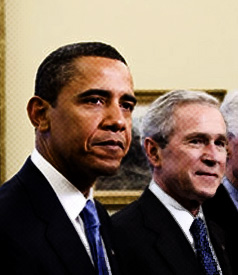Honest, paywall-free news is rare. Please support our boldly independent journalism with a donation of any size.
Washington – Certain decades shape the country’s political life for generations by leaving behind an era to embrace or, at least as often, to scorn.
The 1960s were definitely such a decade. The 1930s qualify, and so do the 1980s. But as important as all these periods have been, their significance may be dwarfed by the reckless and squandered decade that is, mercifully, ending.
I’m afraid that the past 10 years will be seen as a time when the United States badly lost its way by using our military power carelessly, misunderstanding the real challenges to our long-term security, and pursuing domestic policies that constrained our options for the future while needlessly threatening our prosperity.
I am aware that the previous paragraph is thoroughly controversial, and that befits any description of a politically consequential decade. Much of the contention surrounding Barack Obama’s presidency is simply a continuation of our argument over the effects of George W. Bush’s time in office.
That is why Obama, despite his fervent wishes, has been unable to usher in a new period of consensus. Bush’s defenders know that Obama’s election represented a popular reaction against the consequences of the 43rd president’s time in office. Because Obama is both the anti-Bush and the leader of the post-Bush cleanup squad, his success would complete the rebuke. So the Bush camp — Karl Rove’s regular contributions to The Wall Street Journal’s opinion pages are emblematic — must stay on the attack.
Domestically, Obama inherited an economic catastrophe. Dealing with the wreckage required a large expenditure of public funds that increased a deficit already bloated by the previous president’s decision to fight two wars and to cut taxes at the same time. Bush’s defenders, preferring to focus attention away from this earlier period of irresponsibility, act as if the world began on Jan. 20, 2009, by way of saddling Obama with the blame for everything that now ails us. But the previous eight years cannot be wished away.
Our current president is more deliberate about the use of American power than his predecessor was, and determined to repair America’s image with other nations. Obama is committed to fighting terrorism, but does not believe that a “war on terror” should define American foreign policy.
This leads directly to another essential argument over the meaning of the last decade: whether the proper response to the 9/11 attacks included not only the widely supported retaliation in Afghanistan but also the invasion of Iraq. Obama’s view — that the Iraq War wasted American power and dissipated good will toward us around the world — is a direct reproach to the core assumptions of the Bush foreign policy.
So is Obama’s refusal “to set goals that go beyond our responsibility, our means, or our interests,” as he put it in his recent West Point speech, as well as his insistence upon appreciating “the connection between our national security and our economy.” This measured approach to the use of force is antithetical to a foreign policy based on “bring ’em on” and sweeping pledges to “defeat our enemies across the world.”
But this makes it imperative for Obama to inspire trust in his capacity to thwart terrorism, and his administration’s initial response to the Christmas Day airliner attack fell short. Republicans were shameless in politicizing the incident, knowing that rehabilitating Bush’s approach to terrorism depends upon discrediting Obama’s. The president can’t afford to give them anything to work with, as he finally seemed to grasp on Tuesday.
It should not surprise us that the battle for the future will be shaped by struggles over the past. How often over the last 40 years have conservatives defended their policies in the name of rolling back “the excesses of the ’60s”? For even longer, liberals were charged with being locked into “the New Deal approaches of the 1930s.” Liberals, in turn, pointed proudly to both eras as times of unparalleled social advance.
As for the 1980s, they remain a positive reference point for conservatives even as progressives condemn the Age of Reagan for opening the way to the deregulatory excesses that led to the recent downturn.
Americans instinctively recoil at living too much in the past. Yet we have no choice but to reach a settlement about the meaning of the last 10 years. It is the only way we will successfully turn the next 10 into a decade of renewal.
(c) 2009, Washington Post Writers Group
A terrifying moment. We appeal for your support.
In the last weeks, we have witnessed an authoritarian assault on communities in Minnesota and across the nation.
The need for truthful, grassroots reporting is urgent at this cataclysmic historical moment. Yet, Trump-aligned billionaires and other allies have taken over many legacy media outlets — the culmination of a decades-long campaign to place control of the narrative into the hands of the political right.
We refuse to let Trump’s blatant propaganda machine go unchecked. Untethered to corporate ownership or advertisers, Truthout remains fearless in our reporting and our determination to use journalism as a tool for justice.
But we need your help just to fund our basic expenses. Over 80 percent of Truthout’s funding comes from small individual donations from our community of readers, and over a third of our total budget is supported by recurring monthly donors.
Truthout has launched a fundraiser, and we have a goal to add 242 new monthly donors in the next 48 hours. Whether you can make a small monthly donation or a larger one-time gift, Truthout only works with your support.
